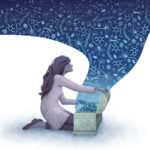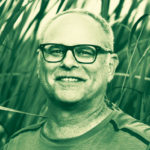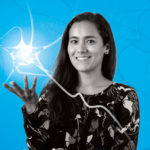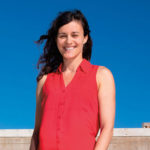Next Gen Corina Antal From tagging sharks to tackling tumors
From wrangling bull sharks to climbing mountains to seeking a cure for pancreatic cancer, Antal follows her passions, and she is redefining what it means to be a scientist.
Antal grew up in Chicago, with a keen interest in marine biology; she frequented the nearby world-renowned Shedd Aquarium because the underwater world captivated her imagination. After graduating from high school, Antal moved to Florida to pursue a degree in marine biology at the University of Miami.
In Miami, Antal wanted to understand the population dynamics, diet and genetic differences of sharks in order to aid in global conservation efforts to maintain healthy oceans. Antal would take a boat into Biscayne Bay, hop into the water and then attempt to hold a shark while another student tagged it and took a biopsy.
Although her research was invigorating, Antal wondered what it would be like to conduct research that had a more direct impact on humans. The summer of her junior year, she stumbled across an opportunity to study a chronic bladder condition called interstitial cystitis.
“I wanted to have a bigger impact on human health and disease,” says Antal. That desire led her to pursue a PhD in biomedical sciences at UC San Diego. There she examined the role of protein kinase C (PKC) in tumors by trying to identify how cancer-associated mutations affected this enzyme at the molecular level.
“We expected that the PKC mutations would cause tumors. Surprisingly, we found the opposite,” says Antal. “PKC was acting as a tumor suppressor, so our research suggested a shift in therapeutic strategies targeting PKC.”
Antal’s graduate work became nationally recognized for its potential to point to new treatments; she made the 2016 Forbes “30 Under 30” list in the science category for her discovery.
“While I was in graduate school, my mother was diagnosed with triple-negative breast cancer, an aggressive and difficult-to-treat cancer,” says Antal. “This inspired another change in my career trajectory as I decided that I wanted to tackle the deadliest cancers.”
Upon graduating, she joined the lab of Ronald Evans at Salk, where Antal chose to focus on pancreatic cancer, which is difficult to treat and has a poor prognosis. Research in the Evans lab focuses on foundational and translational discoveries, such as figuring out that a chemically modified form of vitamin D can break down the barrier that protects pancreatic tumors, allowing for better drug delivery and immune cell support.
During one of her recent research projects at Salk, Antal identified RNA-binding proteins that seem to play a role in pancreatic cancer. Serendipitously, one of the country’s leading experts in RNA-binding proteins was located across the street, at UC San Diego, and he happens to be Antal’s husband. As it turns out, Professor Gene Yeo was in the process of writing a paper about the exact protein Antal was interested in. They are now starting an academic collaboration to examine how these RNA-binding proteins affect pancreatic cancer development.
Despite the fact that their work happens to overlap, Antal did not meet Yeo through academic pursuits. They met while training for the Coeur d’Alene Ironman Triathlon (a 2.4-mile swim and a 112-mile bike ride, followed by a 26.2-mile marathon) when she was in graduate school. These days, Antal and Yeo have less time for Ironman training, but they still manage to dash outside to go rock climbing. Two of their favorite spots are Red Rock Canyon and Holcomb Valley Pinnacles.
“There are so many scientists who climb. I’ll be climbing my route, and all of a sudden I hear someone talking about CRISPR or DNA sequencing. It’s a great community,” says Antal.
She also recently became involved with the Pancreatic Cancer Action Network and started a Salk team to participate in the PurpleStride Walk and Run event. Through these experiences, she has met a lot of pancreatic cancer patients, and these relationships drive her to keep searching for a cure.
“I feel like my career has been a series of haphazard opportunities,” says Antal with a laugh. “But I’m very happy where I ended up.”
Featured Stories
 The Promise and Perils of Big DataSalk scientists are unlocking the power of "big data" to make unprecedented discoveries in neuroscience, cancer and other areas.
The Promise and Perils of Big DataSalk scientists are unlocking the power of "big data" to make unprecedented discoveries in neuroscience, cancer and other areas.
 Joseph Noel – Learning from LagoonsInside Salk sat down with Noel to learn about his path to becoming a scientist and about his current work researching coastal wetlands to help combat climate change.
Joseph Noel – Learning from LagoonsInside Salk sat down with Noel to learn about his path to becoming a scientist and about his current work researching coastal wetlands to help combat climate change.
 Krishna Vadodaria – Uncovering the mysteries of depressionStaff Scientist Krishna Vadodaria's research on human neurons is helping to uncover the biological basis for psychiatric disorders and why some depressed patients do not respond to SSRIs.
Krishna Vadodaria – Uncovering the mysteries of depressionStaff Scientist Krishna Vadodaria's research on human neurons is helping to uncover the biological basis for psychiatric disorders and why some depressed patients do not respond to SSRIs. Corina AntalCorina Antal is not your typical researcher. From wrangling bull sharks to climbing mountains to seeking a cure for pancreatic cancer, Antal follows her passion.
Corina AntalCorina Antal is not your typical researcher. From wrangling bull sharks to climbing mountains to seeking a cure for pancreatic cancer, Antal follows her passion.






















































